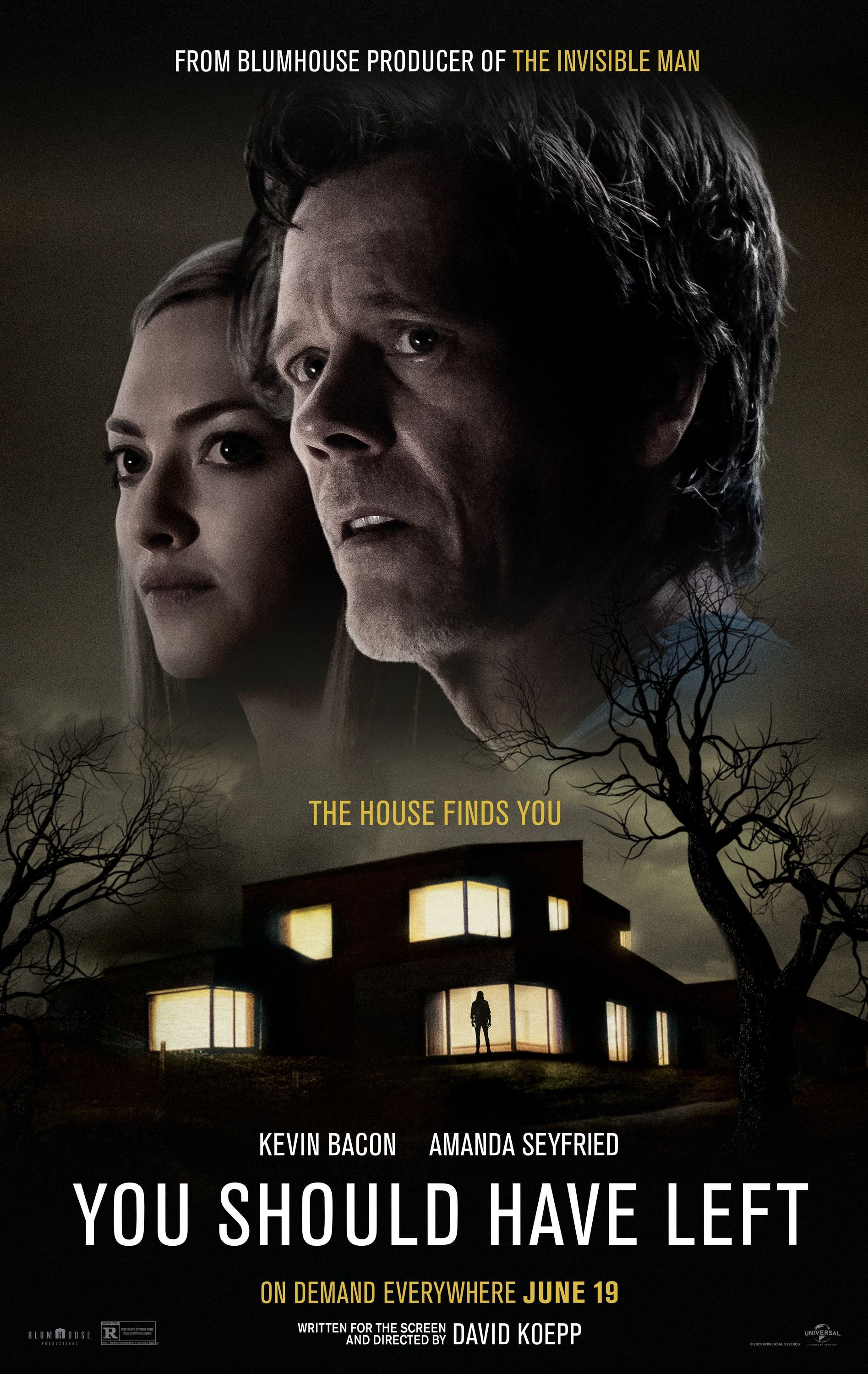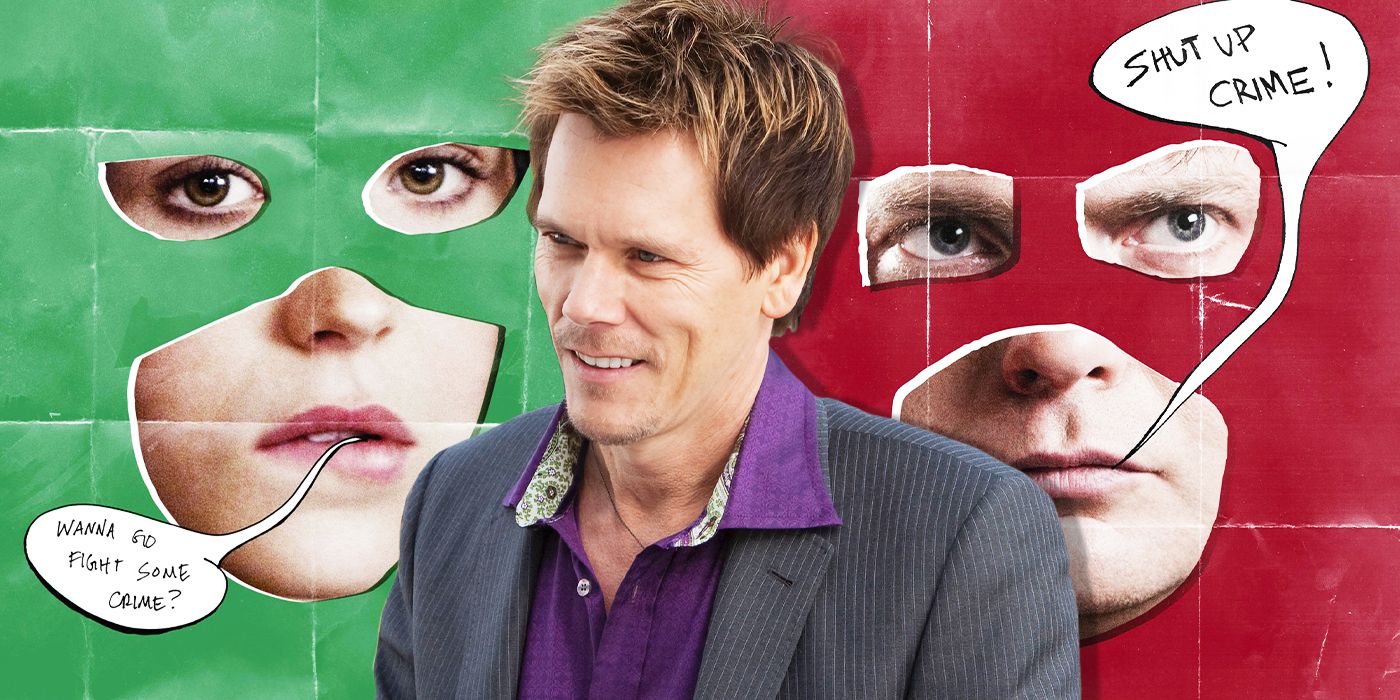The Big Picture
- While
You Should Have Left
offers slightly eerie chills, not true horror, Kevin Bacon’s performance as Theo, a troubled protagonist, is solid and engaging. - The haunted house in
You Should Have Left
serves as the explicit antagonist, representing Theo’s psyche and pushing him to confront his past. - Through a unique twist on the haunted house trope, the film delves into guilt, sin, and the psychological depths of its characters, but the execution falls somewhat short.
After 1999’s Stir of Echoes, director David Koepp and actor Kevin Bacon teamed up again in 2020 to recreate a psychological horror novella, You Should Have Left. While the film’s execution dulls the film down to a B grade, offering slightly eerie chills rather than haunting us, the premise is undeniably strong and intriguing. Bacon steps into the role of Theo, a wealthy man who is navigating his insecurities about being in an age-gap relationship while also tackling the guilt he feels over his past. He is eventually forced to confront the sins of his past through an enduring horror staple, the haunted house. However, as the supernatural aspect of the film is heightened, the house essentially turns into Theo’s own psyche, offering an interesting take on the haunted house trope.

You Should Have Left
A former banker, his actress wife, and their spirited daughter book a vacation at an isolated modern home in the Welsh countryside where nothing is quite as it seems.
- Release Date
- June 18, 2020
- Director
- David Koepp
- Runtime
- 93
- Writers
- David Koepp , Daniel Kehlmann
- Studio
- Universal Pictures
What Is ‘You Should Have Left’ About?
You Should Have Left follows a small family unit of a retired banker, Theo; his second wife, who is a thriving actress – Susanna (Amanda Seyfried); and their daughter Ella (Avery Tiiu Essex). With a strained relationship, the family decides to stay at a countryside vacation house to find some time to heal. Despite the house’s stunning views and quiet interiors, its modern touch and dull tones renders it soulless. Unfortunately, this dreariness isn’t only applied to the setting, as the glacial pace of the film and its lackluster execution dampens the more intriguing events to come. From the mathematical impossibilities of the house’s room lengths and angles, to the ephemeral yet visceral dreams Theo is engulfed in throughout the film, these exciting events are rendered dull by the complacency with which the events are delivered.
While there is nothing overtly scary about the film, there is a hint of potential in the labyrinth scenes of hallways and doors that Theo and Ella are constantly being drawn into. These scenes are mainly effective through the grounded yet panicked acting of both Bacon and Essex, whose on-screen father-daughter relationship is fairly believable. Yet while the premise offers utter confusion, the execution makes it too straightforward. We are guided through an almost systematic progression of events, each chipping away at Theo’s mental state and his relationship with Susanna. As these bizarre occurrences progress and the tension between the couple rises, Theo finds himself finally confronting the secrets that the haunted house covets, only to be met by an antagonist he cannot possibly win against.
Kevin Bacon Is a Troubled Protagonist in ‘You Should Have Left’
In the source material, a haunting novella by David Kehlmann, the protagonist is a screenwriter who recounts the tale of his vacation in jagged fragments. Koepp decides to turn the screenwriter into a retired banker, revealing in an interview with ARS Technica, “I also think a writer in a remote house possibly losing his grip on reality is a story we’ve seen numerous times before. I wanted to mix things up a bit.” This is the only departure from the source material that actually works in the film, as a more traditionally rational person is forced down a spiral instead. And Bacon sells the part as he drifts between calculated and tormented throughout the film, especially through his seemingly serene journaling habits, which later become more dour and panicked.
Theo is both tortured by his past and his present. Very early in the film, the age-gap between the couple is mentioned and highlighted as a sore point for Theo’s insecurities. Bacon and Seyfried themselves have a 27-year age gap and this casting choice was no accident, according to Koepp in an interview with Entertainment Weekly. Intrigued by how older men and younger women were naturally cast as couples in cinema, Koepp wanted to play up this aspect, also seen through Susanna’s occupation as a star actress. This age-gap is presented as the root of Theo’s current insecurities, as the “digital generational gap” would lead to small tense moments of not getting “being on the phone all the time,” or doubts about not being in his “sexual prime.” This is alongside the unique challenges of being married to an actor or actress while not being in the industry.

Kevin Bacon’s Most Underrated Role Was in This Non-MCU Superhero Movie
Even nice guys know how to be villains.
These current insecurities surrounding his marriage to his second wife are compounded by the guilt surrounding the death of his first wife. We learn that Theo had indirectly facilitated the drowning of his first wife by refusing to save her as she overdosed in the bath tub and struggled to break the surface. Instead of choosing a humane way to end their marriage, like divorce, Theo opted for witnessing and ignoring her death. This completely solidifies his fear of confrontation or lack of emotional communication skills, speaking to his own struggle to confront or communicate with himself.
The Haunted House in ‘You Should Have Left’ Takes on a Deeper Meaning
The final plot twist reveals that the strange shadowy figure Theo was battling against was no other than the villainous version of himself. As the otherworldly events in the house grow increasingly bizarre, it steps entirely into the supernatural as a demon-like version of Theo reveals himself and the house’s intentions. Claiming that the house finds the person and not the other way around, it initially seems like the film is a supernatural tale of hell luring sinners into its arms. However, a more interesting perspective is that the rampant house is simply the physical manifestation of the wrought mind of Theo.
As Theo refuses to acknowledge his insecurities and represses the sins of his past, he is met with an idyllic setting he strives to be in. However, slowly the seams begin to unfurl as he notices the house subtly defies the laws of physics – that there are seemingly impossible hidden depths to his mind he was unaware of. As the dizzying labyrinth of doors and rooms grows alongside the blurring between reality and his feverish dreams, he is still sorting through the debris of his mental state but can’t quite achieve any sort of revelation. The inability to escape from his own psyche is overtly inherent in the scene plucked right out of Coraline as Theo and Ella walk away from the house, only to return.
The sinister polaroids, messages, and mirror images all point towards the subconscious guilt that is trying to force Theo to confront his past and his present. In this sense, the house not only materializes his mental state, but also deftly pushes Theo towards it through a disorienting journey. As such, once he is finally facing his sins, guilt, grief, and himself in the finale, Theo can take the first step towards healing. It is not only the horrors of his first marriage that he must confront, but also the misery he was causing his current family, as he had not dealt with his own insecurities. By encouraging Ella and Susanna to leave him behind, he catalyzes their own healing journey.
‘You Should Have Left’ Plays On the Haunted House Horror Trope
Released at the height of indie horror films like Midsommar, and It Follows, You Should Have Left follows the trend of playing on a horror trope in a unique way. The haunted house, or the house with a dark past, is a genre staple in horror, but it tends to simply become a creepy locale for other sinister forces to arise. In You Should Have Left, the haunted house becomes the sinister force, or the explicit antagonist of the film. Theo’s doppelgänger is really just an extension of the house itself, becoming more of a human-shaped puppet to further antagonize Theo. Arguably, the house, Theo’s mirror image, and Theo himself could be considered one single entity, as they all become different aspects of Theo’s psyche, trying to further their own agendas.
The title also plays into the idea of somewhat subverting the haunted house trope. Initially, You Should Have Left seemed like a glib remark that could be applicable to anyone venturing into a questionable home. It’s a phrase we constantly think of as characters in paranormal films rationalize strange noises or bizarre occurrences. However, as we learn the truth behind the death of Theo’s first wife, it can easily apply to how Theo handled his previous marriage. Had he just left through more legal pathways of divorce, the gnawing sin and guilt wouldn’t have led him to the doors of this vacation home. Subverting a horror trope to sift through guilt and grief, the film tries to find a balance between creating a visceral haunted house and a dream-like reality, but fails to truly capture the haunting essence of its source material through its simplistic execution. Yet the premise remains sound as the house grips us into Theo’s harrowing journey of guilt and sin, pushing the boundaries of what the horror trope of the haunted house was originally intended to be.
You Should Have Left is available to rent or buy on Apple TV+ in the U.S.


